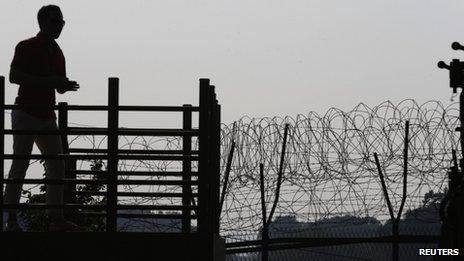North and South Korea agree to government-level meeting
- Published
- comments

Officials from North and South Korea have agreed to hold their first high-level meeting since 2007.
The agreement came after hours of preliminary talks in the truce village of Panmunjom aimed at rebuilding trust between the two sides.
The talks will take place in Seoul on Wednesday and Thursday.
The announcement follows months of tension between the two nations, following the North's third nuclear test in February.
'Separate statements'
The talks in Panmunjom - where the armistice agreement ending fighting in the 1950-53 Korean War was signed - continued into the night.
The deal to hold higher level talks came in the early hours of Monday, but the two sides have not yet agreed on the other detailed agenda items.
"Both sides issued separate statements on the outcome of discussions after failing to narrow differences over the level of chief delegate and agenda," South Korea's Unification Ministry said.
Unification Minister Ryoo Kihl-jae will lead South Korea's delegation to the meeting later this week and has asked the North to send the head of the United Front Department of the ruling Workers' Party, Kim Yang-gon.
However, it is not yet clear who the North will send to the meeting.
An unnamed official from South Korea's Ministry of Unification would not confirm reports that denuclearisation would be discussed at the meeting, but said that "all matters that can enhance peace and stability can be discussed at the two-day talks", South Korean news agency Yonhap reported.
North Korea's Central News Agency said the main point of discussion would be restoring suspended commercial links, particularly the Kaesong joint commercial zone which was shut down by the North in April as tensions escalated.
Other issues up for discussion are the reunion of separated families and their relatives and the resumption of tours to North Korea's Mount Kumgang.
South Korean tours to the North Korean resort ended after a South Korean tourist was shot and killed by a North Korean guard in 2008.
Revenue stream
Ties between the two Koreas deteriorated earlier this year in the wake of the North's nuclear test on 12 February.
Pyongyang withdrew its workers from the Kaesong in April, apparently angered by tightened UN sanctions after the nuclear test and annual South Korea-US military drills.
The Kaesong commercial zone, seen as a symbol of North-South co-operation, had run successfully for more than eight years.
The zone was a key source of revenue for the North and the biggest contributor to inter-Korean trade.
Around 53,000 North Korean workers were employed at the Kaesong factory complex by more than 120 South Korean factories.
Last Thursday, the North offered talks with the South on the resumption of operations and said it would reconnect a Red Cross hotline if Seoul - which had been seeking such talks - agreed.
The new South Korean leader, President Park Geun-hye, has said she wants to build trust after a period of very chilly ties under the previous administration in Seoul.
The inter-Korean talks in Panmunjom closely follow a summit in California between US President Barack Obama and Chinese President Xi Jinping.
Both leaders agreed that North Korea had to denuclearise and that neither country would accept North Korea as a nuclear-armed state, US National Security Advisor Tom Donilon said on Saturday.
China is seen as a key ally of Pyongyang and the only nation capable of brining meaningful pressure to bear on the communist state.
Japan's Chief Cabinet Secretary Yoshihide Suga welcomed the announcement of talks between the two Koreas. "As for Japan, we will maintain close co-operation with South Korea, the United States and other related countries in dealing with the issue," he said.